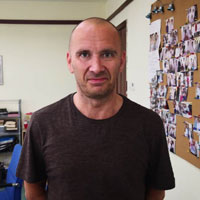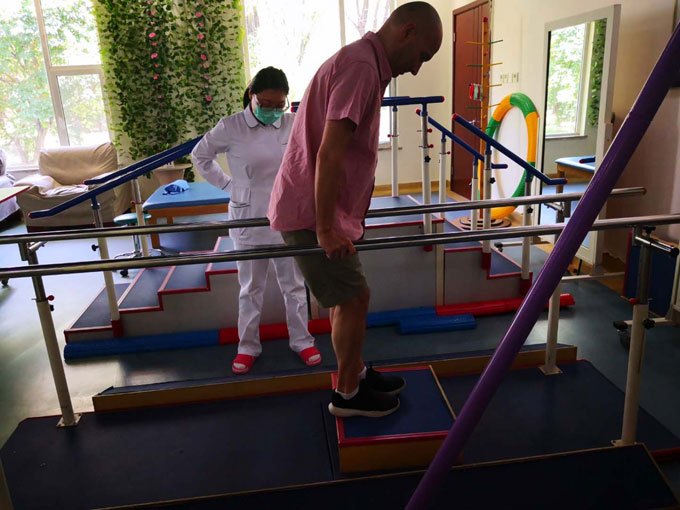Per Hojgaard-Amyotrophic Lateral Sclerosis-(Denmark)
 Name: Per Hojgaard
Name: Per Hojgaard
Sex: Male
Nationality: Danish
Age: 48Y
Diagnosis: 1. Amyotrophic Lateral Sclerosis + Dementia 2. Epilepsy
Discharge Date: 2019/06/09
Before treatment:
A year ago the patient had no inducement to develop cognitive impairment, which was gradually aggravated. The main symptoms are memory loss, decreased comprehension, decreased language expression, difficulty in finding words, decreased calculation power and he did not know how much 1 plus 1 was. It was difficult for him to use a mobile phone, computer etc. No abnormalities were found in the examination by the local hospital. The condition was getting worse. Six months ago his right arm became weak, accompanied by pain and muscle atrophy. Dysphagia began to occur 3 months ago and there was choking and coughing while eating and drinking water. After examination it was diagnosed as "amyotrophic lateral sclerosis superimposed dementia". At present, the patient has decreased exercise endurance, is easy to fatigue and has poor right hand activity. Memory and comprehension loss is obvious, dialogue needs to be repeated several times to understand the problem, calculation ability is obviously reduced, and he needs other’s help in his life
He has poor spirit, obvious depression, sleep, urination and defecation function are regular. He has a history of post-traumatic epilepsy, he takes lamotrigine and his epilepsy is controlled well.
Admission PE:
Bp: 130/82mmHg, pulse rate: 73/min, breathing rate 19/min. height 171cm, weight 71kg, body temperature: 36.4 degrees. Patient has good nutrition status and normal physical development. There is no ecchymosis of the skin or mucosa, no congestion of the throat, no swelling of the tonsils, a symmetrical chest, clear respiratory sounds of both lungs and no dry or moist rales heard. He has regular heart sounds, regular heart rhythm (heart rate, 84/min), no obvious murmur was heard in valves, a soft abdomen with no tenderness and masses, normal liver and spleen and no edema of the legs.
Nervous System Examination:
Patient was alert, in good spirit, had clear but slow speech, word finding difficulty, memory decline, bad calculation and normal orientation. Both pupils were round and equal in size, with a diameter of 3 mm, reacting sensitively to light, free eyeball movement and no nystagmus. He has a symmetrical forehead wrinkle and nasolabial fold, strong eye-closing and normal cheeks-bulging ability. The tongue sticks out in middle, there is no tongue muscle fasciculation, mild tongue muscle atrophy and flexible tongue muscle
movement. He has strong soft palate-lifting, strong neck-turning and a strong shrug. Muscle power: right arm 4; left arm 5-; right gripping power 4-; left gripping power 5; both legs muscle power was 5. Normal muscle tone of the 4 limbs, weak muscle volume in right arm musculus biceps brachii, musculus triceps brachii, ulnar muscle group, minor thenar, major thenar, and interphalangeal muscle group. There is active tendon reflexes of the arms, hyperactive bilateral knee reflexes, normal heel reflex, positive Hoffmann sign bilaterally, positive Rossilimo sign bilaterally, probable positive Babinski sign bilaterally, normal deep and shallow sensation by gross examination, normal heel-knee-tibia test, remarkable fast alternate finger to finger, and finger to nose test and a negative meningeal irritation sign.
Treatment:
After the admission he received 3 nerve regeneration treatments (neural stem cells and mesenchymal stem cells) to repair his damaged brain and spinal cord nerves, replace dead nerves, nourish nerves (ganglioside, nerve growth factors and neurotrophic factors), improve body environment (Edaravone and Riluzole ), regulate his immune system and improve blood circulation. This was combined with rehabilitation training.
Post-treatment:
After 14 days treatment there was remarkable muscle power increases in his right limbs (arm 5-; right gripping power, 5-), better movement endurance, obvious improvement in his swallowing function, improvement in his short term and instant memory, he was more sensitive to numbers, had better reaction and intelligence. He can now complete a simple addition from 1-10.



